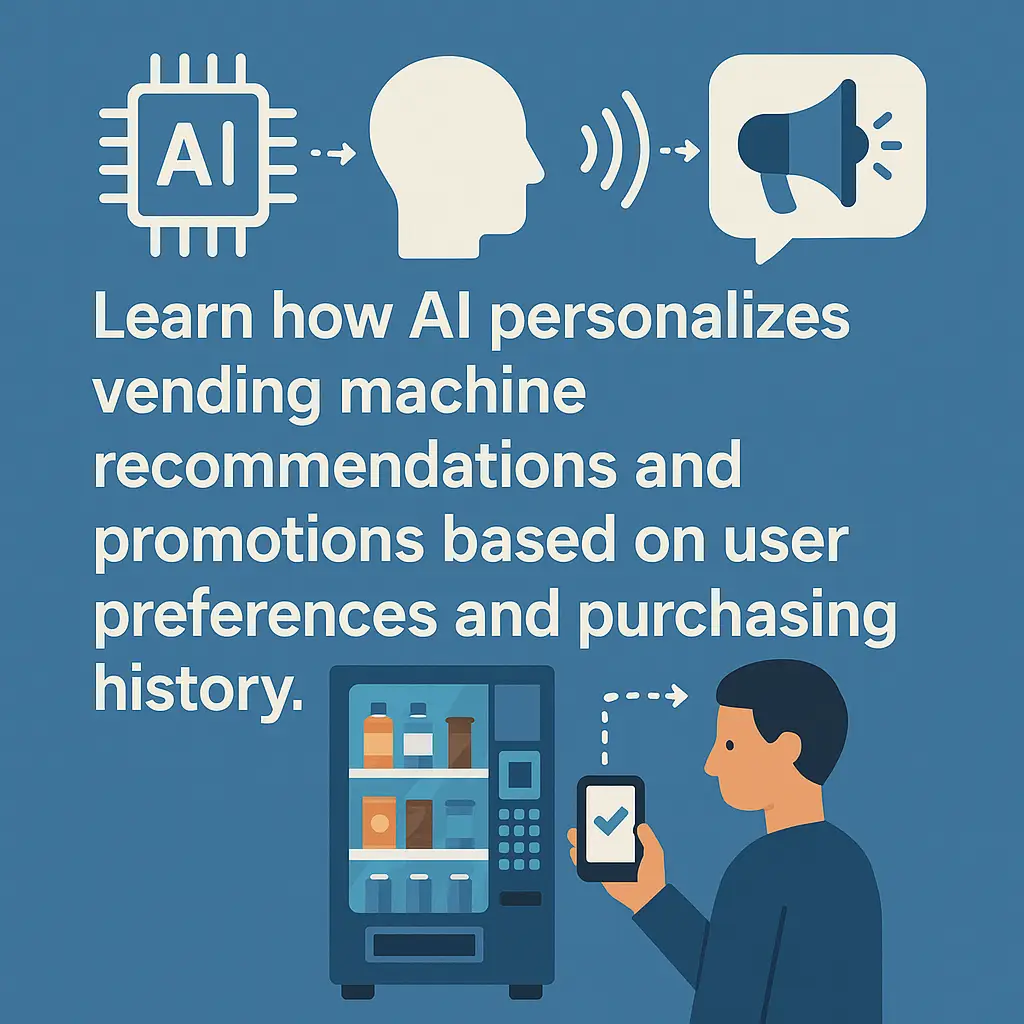Personalized Vending Experiences with AI
Learn how AI personalizes vending machine recommendations and promotions based on user preferences and purchasing history. Enhance customer engagement and sales.
Back to Vending Technology ResourcesLearn how AI personalizes vending machine recommendations and promotions based on user preferences and purchasing history. Enhance customer engagement and sales.
Back to Vending Technology ResourcesArtificial intelligence is revolutionizing the vending industry, moving beyond simple transactions to create unique, tailored experiences for every customer.
![]() AI analyzes past purchases to suggest favorite items instantly
AI analyzes past purchases to suggest favorite items instantly
![]() Dynamic promotions automatically adjust to individual user preferences
Dynamic promotions automatically adjust to individual user preferences
![]() Enhanced engagement leads to higher satisfaction and sales
Enhanced engagement leads to higher satisfaction and sales

In today's fast-paced world, consumers expect convenience and personalization. Vending machines, traditionally seen as static dispensers, are now being elevated into smart, responsive retail points thanks to artificial intelligence (AI). Personalized vending experiences leverage AI to understand individual user preferences, purchasing patterns, and even external factors to deliver highly relevant product recommendations and promotions. This not only enhances customer satisfaction but also drives significant improvements in sales and operational efficiency for businesses.
AI's role in vending begins with data analysis. By collecting and interpreting anonymous data from each transaction, such as product choice, payment method, and time of purchase, AI algorithms build robust profiles. This allows a smart vending machine to greet a returning customer and suggest their usual coffee or offer a new protein bar based on their past healthy snack choices. This level of predictive insight moves vending from a transactional model to a truly interactive and engaging customer journey. Modern units often incorporate interactive vending machine screens that highlight these personalized offers.
Beyond individual preferences, AI can also optimize the machine's performance. It can analyze sales trends across different times of day, days of the week, and even in response to local events or weather conditions. For example, an AI-powered cooler might recommend chilled beverages more prominently on a hot day or suggest comforting hot drinks during a cold snap. This dynamic responsiveness minimizes stockouts of popular items and reduces waste from slow-moving inventory, making vending operations more cost-effective and sustainable. Furthermore, incorporating telemetry in vending machines provides real-time data back to operators, allowing continuous optimization.
The integration of AI also opens doors for dynamic pricing strategies, where discounts are offered to boost sales of nearing-expiration items or reward loyal customers. This flexibility allows businesses to maximize revenue while simultaneously providing value to their customers. With features like mobile apps for vending purchases, the entire experience becomes increasingly seamless and user-friendly, catering to modern payment preferences and ensuring rapid transactions. Embracing AI in vending is not just about technology; it's about creating a smarter, more customer-centric retail experience that benefits everyone involved.
AI analyzes user purchasing history, preferences, and even external factors like time of day or weather to suggest relevant products.
It typically uses past purchase data, payment methods (for identification), browsing history on interactive screens, and sometimes anonymous demographic data.
Yes, AI can enable dynamic pricing based on demand, stock levels, time of day, or individual user loyalty, offering targeted discounts.
They lead to increased sales, enhanced customer satisfaction, reduced waste from unpopular items, and valuable insights into consumer behavior.
Reputable AI vending providers adhere to strict data privacy regulations, often anonymizing data and offering opt-out options for personalization.
Recommendations can be personalized for a wide range of products, including snacks, drinks, fresh meals, and even non-food items like electronics.
By building a profile of individual preferences over time, AI can display tailored product suggestions, promotions, and even custom greetings on screen.
Absolutely. AI-driven systems provide operators with data on popular and less popular items, helping optimize inventory specific to a location's user base.
While initial investment might be higher for the advanced technology, the increased sales and operational efficiencies often lead to a greater return on investment.
The future involves deeper integration with loyalty programs, predictive stocking based on events, and even more seamless, frictionless shopping experiences.